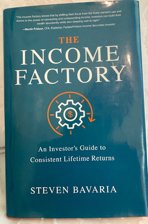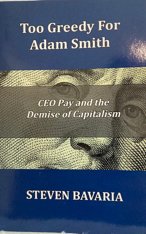Nocatee author’s “Income Factory” helps investors through turbulent markets
When Steven Bavaria first introduced his “Income Factory” about five years ago, he received some negative feedback for suggesting that “market price growth” need not be an essential part of a long-term investment strategy.
But the recent stock market turbulence and financial uncertainty has heightened interest in his Income Factory philosophy, which focuses on “creating your own growth” by reinvesting and compounding high yield investments rather than “wishing, waiting and hoping” for the often-fickle market to do it for you.
Bavaria says the big advantage to his strategy is that during unsettled stock market periods, like this past year, a typical “growth” portfolio sits dead in the water while investors collect cash dividends of only 1% or 2%.
Meanwhile an Income Factory, while equally uninspiring from a price-growth perspective, is churning out cash distributions at a 9% or 10% rate, Bavaria says. Investors can reinvest that cash in additional stock, funds or other income-producing assets, at bargain prices and above-average yields in the current environment. So even though the market prices of their assets may currently be down or going nowhere, the income they generate continues to grow, month after month.
“That means when I get my dividend payments every month, I can reinvest them and, essentially, give myself a raise,” Bavaria explains. “So, I know that my real ‘wealth,’ as defined by the income my portfolio (i.e. factory) produces, is continually growing, even if the market value doesn’t reflect it yet.”
Bavaria, who moved to Ponte Vedra earlier this year, has managed to attract 13,000 followers on the Seeking Alpha investment website, have a book (“The Income Factory: An Investor’s Guide to Consistent Lifetime Returns”) published by McGraw-Hill, and more recently start a subscription service, Inside the Income Factory, for Seeking Alpha readers who want more frequent, personal access to the author and other Income Factory practitioners.
The approach has resonated with thousands of readers of Bavaria’s book and articles who have adopted Income Factory strategies and are achieving more predictable investing results with less angst and drama.
Key to the reduced “angst and drama” is the wider range of investment “bets” that Income Factory investors can choose to execute their strategy.
“Securities in our Income Factory don’t have to outperform,” Bavaria explains. “All they have to do is keep on making the interest and dividend payments they already make.”
He calls that “non-heroic” investing. If it were a horse race, the “heroic” investments that expect above-average growth over time (i.e. investing in stocks) are the equivalent of betting on horses to win the race, or at least place or show, meaning they have to do much better than the average horse in the field.
Income Factory horses (i.e. credit bets) only have to “finish the race,” i.e. stay in business and make the interest and dividend payments they currently do.
Which is the safer bet — Bavaria asks — betting on specific horses to win, place or show, or betting on the entire field of horses to just finish the race? His bottom line: credit bets are much easier and predictable to win than equity bets.
Breaking Free From The Financial Media
Bavaria encourages investors to break free from Wall Street and the financial media’s obsession with day-to-day, minute-to-minute price changes, and focus instead on what really matters: growing an income stream.
In his book he compares CNBC and other business channels to ESPN’s sports coverage.
“Getting the public hooked on 24/7, nonstop sports coverage has been profitable for the teams and the networks, and fun for lots of sports fans,” he says, “but that sort of obsession with minute-to-minute changes in stock prices and indices sends the wrong message to long-term investors, even though it boosts viewership and ad revenues for the networks.”
Bavaria says the idea behind the Income Factory is simple. When Ford Motors builds a new plant, nobody pays attention to its market value, or how much the plant is worth from one week or month to the next. Instead, Ford focuses on how many cars and trucks it produces, and how to increase that output going forward.
In The Income Factory, Bavaria, a former international banker and journalist, adopts a similar approach.
He compares an investment portfolio to a factory whose job is to produce a “river of cash” that can be used to fuel one’s own growth through re-investing and compounding, without being dependent on “the market” to do it. He defies the idea that investment success depends on market appreciation, demonstrating that “math is math” and a 10% cash yield and 0% growth produces the same total return as a 0% cash yield and 10% growth.
The biggest mistake investors make, Bavaria says, is losing their nerve and getting defensive during downturns. They may “get off the investment train,” as he puts it, and then find themselves “standing on the platform when the train starts up and pulls out of the station.”
Having your own steadily growing income stream through financial market turmoil, of the sort we’ve seen recently, he says, makes it emotionally easier for many investors to “stay the course and not make typical errors so many investors make in turbulent times, that they regret for years afterwards.”
Bavaria is a financial writer whose books include “The Income Factory” (McGraw-Hill) and “Too Greedy for Adam Smith” (an exposé of CEO pay practices). He and his wife Betsy live in the Del Webb Nocatee community. He is a graduate of Georgetown University and New England School of Law. A former executive of Bank of Boston and Standard & Poor's, he also was a reporter/editor at Investment Dealers’ Digest.
The book is available on Amazon: amazon.com/Income-Factory-Investors-Consistent-Lifetime/dp/1260458539/ref=tmm_hrd_swatch_0?_encoding=UTF8&qid=&sr=












